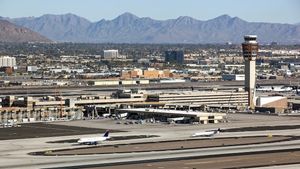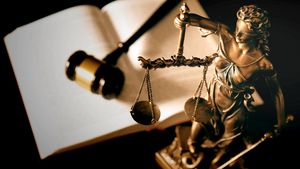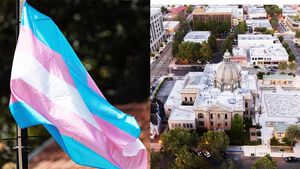We've been covering She-Ra and the Princesses of Power since the empowered, badass reimagining of the classic '80s cartoon was first announced, and although we already know the first three seasons have delivered some of the most diverse and queer-inclusive episodes in recent TV history, we do have one question for the series' fourth round: how much higher are the stakes this time?
From the looks of it, pretty high.
With the recent release of the fourth season on Netflix and the show's recent Critics Choice Awards nomination for Best Animated Series, we chatted with showrunner Noelle Stevenson and voice actor Jacob Tobia (who plays new, nonbinary character Double Trouble) about nonbinary representation, chosen family, and She-Ra's continued impact on LGBTQ+ viewers!
PRIDE: I can't believe we're already at season four of She-Ra! It's been a whirlwind. So what has the journey been like so far and when the series first started, did you think you'd be where you are now?
Noelle Stevenson: I think that everything about this show has surprised me every step of the way. I think the outpouring of love, enthusiasm, the cosplay, how invested everyone is in the characters. It's all just been so incredible to watch and to be a part of. And I am so grateful to everybody for bringing their paths into this show. I can't believe it's been less than a year since season one came out and yeah, I can't wait for everyone to see this new season and episodes still to come. I'm so proud of this show and it's truly been an honor.
With Queen Angella's tragic passing, Glimmer is now in charge of running Bright Moon and leading the Rebellion. So can you talk about more getting to expand her character and then her stepping into this leadership role?
I think that this season is very close to my heart, and it's one that was more personal to me and also for the whole crew. All of us at a certain point we're just kind of putting our own feelings verbatim into the show, I think. There are times where the characters will kind of voice something that we were sort of going through at the time of making the show. Glimmer's arc of being someone who sort of, she's very spirited and she's rebellious and she pushes against authority, to suddenly be thrown into this position where she is responsible for the entire Rebellion, not just the entire Rebellion but all of Etheria and their safety and their wellbeing and suddenly all of her whole kind of toolbox of tricks doesn't work anymore because she's no longer the fighter on the front lines, never giving up, never backing down from a fight.
Suddenly, she has to be the one who is strategizing and making sure that everyone else is okay. And I think that that is very hard on her. It makes her feel isolated from her friends. It makes her feel alone and kind of cooped up. And I think that those feelings come to a head and there's definitely some personal connection to that as well. So I think that it's a really hard spot for her to be in, especially with the stakes so high. Leadership, as you see in this season from Glimmer's point of view, from Adora's point of view, and from Catra's point of view, comes with a huge price and I think that we see it take its toll on all of those characters this season.
Throughout the entire series, chosen family has been a huge theme, but especially now with Queen Angella's absence, Glimmer really has to rely on Bow, Adora, and the rest of her network of her friends and fellow princesses. When you were dreaming up the series, was the theme of chosen family and intense personal friendships that feel like family intentional?
Definitely. I think it's pretty clear that friendship is a major part of the show and that's not uncommon, especially for an ensemble show featuring mostly female characters. But this season I think we wanted to dig a little bit deeper into what that means and kind of test those relationships. This season really is kind of about breaking the characters' relationships to each other and finding them forging bonds that we might not expect. So I think friendship remains essential and as important as ever, but we have to see that it's just not easy and it can be really complicated, it can be really messy and feelings can get hurt and it's not so easy to come back from it. So I think the question at the end of this season is how are they going to come back from it?
Are Glimmer, Adora, and Bow going to come back together? Where does Catra go from here? And then we also see kind of these unexpected bonds arise where Double Trouble and Catra, Scorpia and Glimmer, Glimmer and Shadow Weaver. Even in a weird way I think Catra and Glimmer seeing themselves in each other, we sort of question and explore the themes of friendship more than ever this season. And that was something that I was really passionate about doing because I just don't know that we get to see that enough in media that's aimed at girls and it's something that feels really, really real. I think so many people have gone through something like this and it can be even harder than any romantic breakup. It can be the rifts that happen between friends, between family members; how do you fix those things? Can you fix them? What does being a good friend look like? What does being a toxic friend look like? How can you stop being a toxic friend? Just kind of trying to get into the themes of these relationships that felt maybe a little bit more real and a little bit harder.
This season we got to see a new character played by Jacob Tobia—Double Trouble. Can you talk a little bit about the genesis of Jacob's character and what it was like to work with them and bring them into the She-Ra family?
We were definitely so excited to introduce Double Trouble into the show. Shapeshifters are always my favorite characters. They seemed to fit so well in this season when, like I said, everything turned on its head and bonds were getting tested. Double Trouble is the perfect agent of that chaos. I just loved being able to explore them playing both sides. I just loved that they were so above it all, they are having so much fun messing with everybody.
And then at the end of the season, we see that they cut right to the heart of Catra. They're able to kind of see through the defenses and the disguises that these characters have constructed for themselves. And I think that's what makes them kind of the key player in this season. And Jacob, they bring that little smirk, they bring that smile to everything that Double Trouble does. It is always so much fun to watch, which I think is Double Trouble's main M.O. They are there for their own entertainment and to be praised for their performance.
A lot of other series are moving forward with gay representation, lesbian representation, bisexual representation, but I feel like gender nonconforming and nonbinary folks still aren't getting as showcased in media as they should be, and it's groundbreaking for an animated series to include a nonbinary character. I know we've talked a lot about it already, but with you making it a mission on She-Ra to be as inclusive on the show as possible, why is it important to you to include nonbinary representation in the show and the effect it will have on kids who have never seen themselves reflected that way before?
I think that for us it felt very organic. I don't think we quite realized. I certainly did not know that there hadn't been another recurring nonbinary character played by a nonbinary actor. Our crew is a large portion nonbinary, trans, and gender nonconforming, so for us, I think Double Trouble was a little bit of a fantasy. This character feels like they fit so well in this world where gender is overall treated as being pretty fluid. And so it felt really natural. It felt like they fit really well. And I was really over the moon when it turned out that our executives were behind it 100 percent and that we could refer to Double Trouble as using nonbinary pronouns in the dialogue of the show. And that when we ask our casting department to bring us auditions by nonbinary actors, they did that and they brought us such amazing talent, and we were supported the entire way.
So it was something that I'm so, so grateful to everybody for the really warm response that we've gotten to this character even before the show has been out. But you know I think that this is a character that we were really passionate about. And I think in some ways the character is like all of our characters: messy, they're not purely good, they're not purely evil, they are themselves. With some things in the show, we want these characters to be compelling and that includes their gray areas. I don't think in every way they're a perfect role model, but I do think that it's a bit of a power fantasy. That's where we were coming from with this character. I'm very excited for everyone to get to know them.
Were you a fan of She-Ra before landing the role of Double Trouble?
Jacob Tobia: When I auditioned for the role of Double Trouble, season one of the show wasn’t out yet. The only thing I had to watch, I went back and watched the ‘80s version of the show, and pretty instantly fell in love. Even just like, the fashion looks in Etheria in the ‘80s, they worked for me. There was so much fabulous queer energy in the early show. It was fun because I got to be a kid again for a second and pretend I was researching for a role. I wasn’t super familiar with the show because I didn’t watch it growing up, I’m a little too young for that, but once I was auditioning for the show, and I was like looked it up, I instantly fell in love and felt like I was 7 years old in the best way.
What was the process of getting the role of Double Trouble like, and what immediately drew you to the role and made you want to audition?
A lot of people, when they think about how this happened, they look at sort of where I am now and they’re like ‘Oh, probably you just like got a call from DreamWorks saying we have a nonbinary role and we’d love to offer it to you,’ like no. I’m just an actor lady. Since I’ve moved to LA I’ve been auditioning for TV roles nonstop, and it’s annoying because even when you get like close on booking a role, like unless you book the thing you don’t get to celebrate that. A lot of people didn’t realize that I was an actor, and I grew up like acting and very much grew up in the theater and did a little professional theater in college. I’ve been acting for a minute. This is the first role that I’ve booked that we can publicly announce, but yeah so I auditioned for the show like anyone auditions for it, just sending in a vocal tape, and then once I came into the demo session, which is when you record your first episode on a provisional basis, I just knew that like we were off to the races. The character of Double Trouble, they just made so much sense to me right off the bat. Double Trouble is that overly dramatic, musical theater kid from your high school growing up who is now a mercenary. I was just like ding, ding, ding, boom I got it. I know exactly who this person is because I lowkey am that person. Let’s go!
Working with Noelle, working with a queer creator on something like this, it’s just so effortless that it didn’t feel like work to get this character.
She-Ra is a very beloved title, and the fandom spans decades and generations of viewers. It is also one of the more inclusive series on TV right now. What was the most exciting part about joining such an iconic series and working with Noelle and the team on such a diverse show?
I’m just really honored to be part of a franchise that I think is really just sending such a healthy, wholesome, kind, empathetic message to kids all around the world. It’s the kind of show I wish I could have watched growing up. I had some great ones growing up, but it’s the kind of show I wish I could have watched growing up where I feel like, you know, both in terms of everything like race and ethnicity, in terms of body shape and size, in terms of queer dimensionality, in terms of gender… It’s a show that is just so inclusive and so thorough in its inclusivity and so intentional.
The thing that I think is really cool about this particular character in this world is that yes, Double Trouble is historically forward in terms of nonbinary visibility and nonbinary representation, but they’re not even like the first time in the show that gender has been played with. I would argue that most of the characters in the show have moments if not as a default, are gender nonconforming in one way, shape or form. The rules of the gender binary are not applied in Etheria in the same way. Like masculinity and manhood are not these crushing concepts. Femininity and womanhood don’t compel anybody to act a certain way. All the characters in the show are in touch with their power when they need to be, are in touch with their sensitivity when they need to be, are in touch with their fabulosity when they need to be, and are in touch with their grit. And I just love being part of a cast that’s grounded in those principles and part of a universe and a world that is grounded in that.
With ground-breaking, history-making roles like this, there’s often a lot of pressure associated with it. Did you ever have any feelings of nervousness or feel pressure, especially since your character is so groundbreaking?
I never felt a ton of pressure only because I don’t believe in singular role models. I don’t believe that one person can ever stand for the whole community, and I think I released myself of that pressure a long time ago. I am not THE nonbinary leader, ever. I’m never THE nonbinary anything. I am only A nonbinary actor. I’m only A nonbinary actor. I am part of a canon of voices, I am part of a giant group of people who are all pushing for change and who are all transforming things in really exciting ways. And for me, that really helps take the pressure off, right? All I wanna do is have fun with the fandom and enjoy the rollout of the character and celebrate it with fanfare as widely as I can and relish in what this means for our world and for the future going forward. I don’t have to do any of that with this pressure to be a perfect representative, you know what I mean? No one can be, and the moment you think you are, you’ve kind of deluded yourself. That’s been one of the more interesting nuances of unveiling Double Trouble. They are absolutely a historic character, they are one of the first characters to be explicitly nonbinary and to be voiced by a nonbinary voice actor, but they are part of a long tradition of gender nonconforming and queer-coded characters being in animated television, and they are part of a long history of queer and trans creators and illustrators and animators and voice actors being part of this specific section of the industry. Double Trouble is a culmination of so much work and is a breakthrough that is only possible because of the rocket fuel that queer and trans people have been putting into this industry for decades. I think it’s really important that we She-Ra the show doesn’t take the singular credit for this, but names that were part of a community, and we’re part of a powerful group of people who have been working to build a more inclusive animation industry for a long time. I think we’re all honored to be a part of that, and I know I certainly am.
Animation has always been a ground zero of interrogating homophobia and interrogating gender and interrogating transphobia and all that kinda stuff. It’s just cool that it’s a little more open these days about rather than allegorical.
Speaking as an actor, what's it like to just be on a show with Sandra Oh, Geena Davis, like Emmy, Oscar winners, and a bunch of cool people? Aimee, AJ, Karen, Marcus, Lauren...
When I look at the full cast list, it makes my head spin in the best of all possible ways. I could not ask for a better cast to be a part of. The moments where...you know, voice over you do often record alone. Often times it’s just you for the session, but you’ll always overlap with whoever else is recording that day, and like, sit around and wait for your session, and like gab together and hang out. I have had so much fun getting to know everybody else involved in the show, and like, you know, specifically, I feel like I run into AJ most because Catra and Double Trouble have a lot of scenes together and we don’t necessarily record them together, but we often record back-to-back, and so I just feel like we have this really special connection that’s just about being characters in the same world together. It’s so cool. It’s really neat to be part of this crew and to be part of this She-Ra family.
There’s a lot of ships on the show. Catra and Adora or Catra and Scorpia?
Oh gosh. If I have to pick between Catra/Adora, and Catra/Scorpia. Oh, that is a tough choice. And I feel like no matter what, I just want a name, that there is a significant portion of that fandom that is going to be really sad.
But here's what I'm going to say as my politically-correct answer. Are you ready?
Yes.
I just think we could explore polyamory with Catra, Adora, AND Scorpia. I would love to see what that looks like because I don’t wanna pick a side in that debate, and I don’t feel that that’s not my decision to make either, so I’ll just hold that for now. My vision is that maybe they could all three date! Be part of a polycule!
Maybe they should all start by being friends, right? Because if you watch season three and season four, maybe they could all just start by being friends again and then see where it goes from there.
What do you hope viewers feel when they see Double Trouble in season four?
I hope that viewers, and not just nonbinary and trans viewers, but everyone who watches the show, when they see Double Trouble and see what they do in the season and who they are, I hope that people just feel really in touch with their own power. That’s my dream for this character and my dream for how people understand them. People watch the way in which they fearlessly stand up to everybody, and fearlessly tell anybody off and have no fear in the face of power, and that they’re compelled to do the same.
Season 4 of She-Ra and the Princesses of Power is on Netflix!
![]()
































































































































